Len Gutman's Blog, page 20
October 31, 2011
A Few Things That Make Life Worth Living
 We have a Thanksgiving tradition in our family that I'm sure many of you share — we go around the table before dinner and we each say what we are thankful for. It's pretty corny I know, but we do it anyway and truth be told I never really put much thought into it. I suspect this year my entire family is going to look to me for some sort of sage advice now that I am a heart attack survivor (still seems weird to say that). But who the hell knows if any of us are going to still be here on Nov. 24 so I figure why not do it today (I have always been one of the world's worst procrastinators but somehow now that seems like a bad way to go through life).
We have a Thanksgiving tradition in our family that I'm sure many of you share — we go around the table before dinner and we each say what we are thankful for. It's pretty corny I know, but we do it anyway and truth be told I never really put much thought into it. I suspect this year my entire family is going to look to me for some sort of sage advice now that I am a heart attack survivor (still seems weird to say that). But who the hell knows if any of us are going to still be here on Nov. 24 so I figure why not do it today (I have always been one of the world's worst procrastinators but somehow now that seems like a bad way to go through life).
There's a great scene in Woody Allen's Manhattan where he talks into a tape recorder and lists the things that, to him, make life worth living.
There are certain things I guess that make it worthwhile. uh… Like what… okay… um… For me, uh… ooh… I would say… what, Groucho Marx, to name one thing… uh… um… and Willie Mays… and um… the 2nd movement of the Jupiter Symphony… and um… Louis Armstrong, recording of Potato Head Blues… um… Swedish movies, naturally… Sentimental Education by Flaubert… uh… Marlon Brando, Frank Sinatra… um… those incredible Apples and Pears by Cezanne… uh… the crabs at Sam Wo's… uh… Tracy's face…
In that spirit, here goes:
My wife Leslie Gutman and our son Connor Gutman
My family (especially my sister Jodi!)
Arizona sunrises
Tom Wolfe novels
Walking along the beach in Coronado
Every song ever recorded by Joe Jackson
A grande nonfat latte at Starbucks
A gorgeous pair of legs
Field of Dreams
Baseball
College basketball
Driving alone with the radio blaring and no particular place to go
An ice cold craft beer
Dexter
Conversations with friends
My iPhone
A Love Supreme by John Coltrane
movies
Real Time with Bill Maher
Introducing Connor to new films, television shows and music
The Shipping News by Annie Proulx
Wasting an hour browsing for nothing in particular at a good bookstore
Dean Kamen, Shai Agassi, and Elon Musk
Hearing One Shining Moment on the night of the NCAA basketball final
Chilling by a pool…any pool…with a novel and a beer
Seeing Connor's excitement over the latest technology news
Quoting Seinfeld
Spotify
Teaching
My Barnes & Noble nook
Staying in touch with friends, new and old, on Facebook
ESPN SportsCenter
Honeycrisp apples
Well, that's a start. What makes your life worth living?
Filed under: Heart
 [image error]
[image error]
 [image error]
[image error]
[image error]
[image error]

 [image error]
[image error]
October 25, 2011
Workin' Too Hard Can Give You a Heart Attackackackackackack
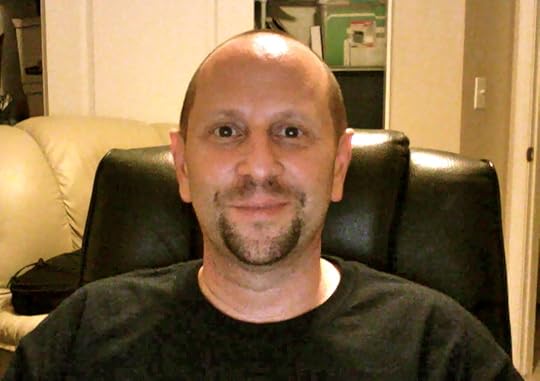
Len Gutman (October 25, 2012)
It's Tuesday, Oct. 25, 2011 and I am lucky to be alive. I don't mean that in some symbolic sense, but rather in the real, honest-to-goodness medical sense. Let me say it again so there is no confusion — I am lucky to be alive.
Ten days ago I had a heart attack. I can't tell you if it was a big heart attack or a little heart attack because my cardiologist said there is no such thing as a little heart attack. Let's get the obvious stuff out of the way first. I am 45 year's old, I jog about three miles, three days per week. I eat very little meat (some fish) and the occasional grass-fed burger. I do not have a stressful job (or life for that matter). I am relatively thin (Prior to last Saturday I was 5-9, 158 pounds). Yet I had an 80-90 percent blockage in my Left Inter-ventricular Artery.
The fact is we cannot escape family history. My father had a heart attack, his father had a heart attack, and his father before him probably had a heart attack as well. After my father had his open-heart surgery about 8 years ago I went to the cardiologist for the first time and he told me to take a baby aspirin every day and come back to see him in five years (I did not). My cholesterol has been high for years, but I have been dutifully taking statins along with my aspirin and I figured with my lifestyle I was doing all the right things. Clearly I was not.
But this blog post is not about looking back, but rather it's about looking toward the future. Thanks to the good folks at Medtronic I have three capable stents propping open my newly cleared artery and I'm taking a host of drugs to nudge my heart back into solid working order. My cardiologist says I can run a marathon one day (though I will not, thank you) and as long as I take my meds and eat right I should die of something other than a heart attack. I will follow his instructions to the tee and am fortunate to have a wonderful life partner for this journey who has already proven in these past few days that she is a more than capable low-fat, low-sodium chef!
But I have some fucking things to say!
First and foremost, I love my wife Leslie and my son Connor more than life itself. This too is not a symbolic statement — I mean it. I am no longer afraid to die, but rather my only fear is leaving my family too soon. I promise to take care of myself even more than I did in the past to ensure my family has the pleasure of having me around for all of life's amazing events going forward.
Colors seem brighter to me now and food tastes better. This may be psychological or may be a result of the sinus surgery that may or may not have had a role to play in my condition. I don't really care.
I am no longer going to find excuses (time, money, etc.) for not doing the things I want to do. We are planning a trip to Europe next summer and not only are these plans still on, you can bet we are not going to skimp on the hotel rooms. Expect to hear about my kayak trip someday soon. I imagine my 2005 Hinda Accord is not going to be my primary form of transportation much longer. Life is just too damn short.
Aside from family, the most important thing in the world is friendship. I have nearly 600 "friends" on Facebook, and many if them have checked in on me over the past week. My close friends have called or come to see me. You can't put a price on that. If you haven't called or come to see me yet, please do. My "door" is ALWAYS open. I love you all and am lucky to have you in my life.
Despite my near death experience, I am sorry to report to my religious friends that the old adage that there are no atheists in foxholes is not true in my case. I believe even more now that life is random and that there is no god. I'm great with this and will continue to live a moral life because it's the right thing to do.
If you are over 40, get yourself checked out by a cardiologist. I did so many right things, but because I did not follow up with my cardiologist I have permanent damage to my heart which would have been prevented had they found and corrected the blockage prior to my "event." By the way, my "event" didn't hurt. I had all the signs (radiating heat, pain down both arms, cold sweat, indigestion and anxiety). I worked through it, denied it was a heart attack, and waited two days to go see a doctor and only then because Leslie insisted. She saved my life, as did my primary care physician for calling 9-1-1 last Monday morning. The nurses at the hospital told me lots of men ignore the tell-tale signs of a heart attack so I am not alone, but my cardiologist said 50 percent of men who have a heart attack at my age die immediately or within six hours. I played Russian roulette and I will never forgive myself, but I am not going to dwell on it. Stay present my friend.
That's it for now. I'm sure I'll have lots more to say going forward. I will be taking about six weeks off work per doctor's orders, and during this time I will eat right, go to cardiac rehab to strengthen my heart, catch up on reading and films (I still have 75 films on the AFI list to get through and no damn heart attack is going to keep me from this ridiculous quest). I expect after a little while I will be able to meet up with friends for lunch or coffee and I will cherish every moment of those meetings.
What I'm looking forward to today: sleeping next to my wife, watching Arrested Development on Netflix with Connor, reading the stack of magazines piled on my end table, resting, visiting with friends…and of course…being ALIVE.
Filed under: Heart





 [image error]
[image error]
[image error]
[image error]
October 9, 2011
AFI #76: Forrest Gump
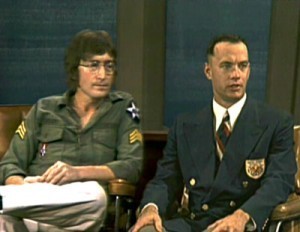 There's nothing quite like watching a great film with someone who has not seen it and so watching Forrest Gump with my son this morning was like watching it for the first time. I remember when I saw Forrest Gump for the first time how I sat there after the film ended with my mouth agape and a feeling like I had just experienced something magical. Connor turned to me at the end and said it was the second best movie he's ever seen (nothing will ever replace Scott Pilgrim Vs the World for him). Only a truly great film can make an impact like that across a generation and Forrest Gump is undoubtedly a great film.
There's nothing quite like watching a great film with someone who has not seen it and so watching Forrest Gump with my son this morning was like watching it for the first time. I remember when I saw Forrest Gump for the first time how I sat there after the film ended with my mouth agape and a feeling like I had just experienced something magical. Connor turned to me at the end and said it was the second best movie he's ever seen (nothing will ever replace Scott Pilgrim Vs the World for him). Only a truly great film can make an impact like that across a generation and Forrest Gump is undoubtedly a great film.
I think what makes Forrest Gump so universally loved is that Forrest sees life through the eyes of a child and all of us can appreciate that. In fact, I'd argue the world would be a better place if we all remembered to look at life in this way more often. It's also a very funny and touching film. The little gags throughout all add up to a brilliant script. I thought Connor was going to go through the roof with laughter when Forrest gets rich because Lt. Dan invested their money in "a fruit company" that was actually Apple Computer. Or when Forrest is running and he steps in dog crap and that inspires the bumper sticker manufacturer to come up with "shit happens." Or when Forrest learns his mama is sick and he jumps off the boat and runs straight home to Alabama. Great gags throughout. Of course it's touching as well, like when Forrest gives half his fortune to Bubba's family or when he takes care of Jenny while she is sick from AIDS. The tear-jerker of course is when Forrest realizes little Forrest is his child and he worries that the child is dumb like he is.
The film is easily one of the all-time greats. It won Oscars for Best Picture, Best Actor for Tom Hanks, best Screenplay, Best Director and of course Best Visual Effects. In fact, it is the visual effects that really set the film apart. The way in which Director Robert Zemeckis weaved Forrest into real historical footage was revolutionary and mind-blowing when you see it for the first time. Best moment: when Forrest drops his pants to show President Johnson his bullet wound! And then the magic of Gary Sinise without legs is still amazing all these years later. The effects are cool, but credit has to go to Sinise for acting as if his legs were gone as well. Brilliant, and of course it earned him his first Oscar nomination.
Watching Forrest Gump is always a treat and it never gets old. A very special film!
Next Up: In the Heat of the Night
Filed under: AFI Top 100

 [image error]
[image error]





September 25, 2011
AFI #77: All the President's Men
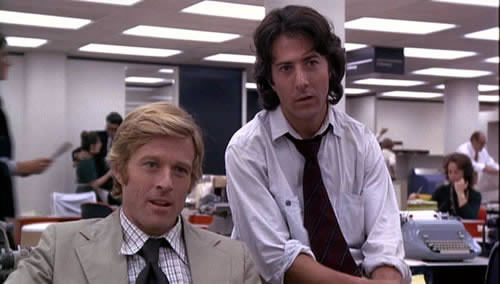 I was 10 year's old when All the President's Men came out and I remember going to see it with my family at the Campus Drive-in on El Cajon Blvd. in San Diego. I know it may be hard to believe, but the film had a major impact on me even at that young age. I knew then I wanted to be a journalist. Over 30 years have gone by and I've probably seen the film a dozen times or so, and each time I am glued to the action as if I had no idea of the outcome. Watching it yesterday was no different — it is undoubtedly one of my all-time favorite movies. But as a bonus, this time Connor watched it with me and he loved it! How cool is that?
I was 10 year's old when All the President's Men came out and I remember going to see it with my family at the Campus Drive-in on El Cajon Blvd. in San Diego. I know it may be hard to believe, but the film had a major impact on me even at that young age. I knew then I wanted to be a journalist. Over 30 years have gone by and I've probably seen the film a dozen times or so, and each time I am glued to the action as if I had no idea of the outcome. Watching it yesterday was no different — it is undoubtedly one of my all-time favorite movies. But as a bonus, this time Connor watched it with me and he loved it! How cool is that?
It seems to me that Watergate marked a critical turning point in American politics. I'm sure we knew politics wasn't all pretty, but when the events of the break-in and cover up came to light in such a public way America lost its innocence about just how corrupt government can be. If you look back at the record, Nixon wasn't such a bad president — he was just a bad person. In the nearly 40 years since Watergate we have come to expect that politics is a dirty game played by people who most likely don't have our country's best interests in mind. Reagan began to divide us along ideological terms, Bush continued his legacy, Clinton created a mockery of the office with his sexual exploits, Bush Jr. used the office to advance his personal agendas and now a weak and vision-less Obama presides over a fully corrupt government that can't even agree on what to disagree on. At least during Watergate Americans pretty much agreed on the fact that Nixon was a crook. But looking back the frat boy antics of Watergate seem like child's play compared to going to war without cause, purposely dividing the nation along class and moral boundaries and bailing out special interests. Should we long for the days of Watergate?
All the President's Men is wonderful because it's a great detective film, with Bob Woodward and Carl Bernstein as Sam Spade and Philip Marlowe. And of course it's even more compelling because it is based on fact rather than fiction. It features great acting and powerful moments of realization. It also features some very cool directing by Alan Pakula, especially in the way he weaves in real footage. I love, for example, the scene where Woodward and Bernstein are working alone in the newsroom while the rest of the staff are gathered around the TVs watching Nixon being sworn in for a second term. The Nixon swearing-in is real footage which makes the scene feel even more real. Pakula does this several times during the film and it's very unique. And of course the film is chock full of great performances by Robert Redford, Dustin Hoffman, Jack Warden, Hal Holbrook and more. Interestingly only Jason Robards, for his portrayal of Ben Bradlee, won the Oscar. In fact, All the President's Men didn't win for Best Picture. It was nominated along with Rocky, Network, Taxi Driver and Bound for Glory. That's a hell of a year for film — Rocky won by the way!
All the President's Men made journalism seem important and romantic. It was a noble calling. I remember reading David Halbertam's The Powers that Be in college and thinking being a journalist was one of the most important jobs in the country. How many of us feel that way today? Journalism itself has fallen victim to the times of division. We either watch Fox or MSNBC. We believe the New York Times or the Wall Street Journal, but not both. Local news has become nothing more than the crime report and a vehicle for advertisements. The Internet has given us the ability to read more news than ever, but none of it has any teeth — the lie of "balance" has given way to articles with no heart and mind. The Fourth Estate has become just another tool for the corporatocracy.
Regardless of how you feel about journalism, All the President's Men surely harkens back to a different time. It's a great film and an important film. And just like then, today if you want to know who is in charge of things all you have to do is what Deep Throat said to Bob Woodward — follow the money!
Next Up: Forrest Gump
Filed under: General








September 18, 2011
AFI #78: Modern Times
 When it comes to a film that was made in 1936, the natural question that comes to mind is does it hold up almost 80 years later. I'm happy to say that Modern Times definitely stands the test of time. Charlie Chaplin was brilliant, and not only did he star in the film he also wrote it, directed it and wrote the damn score. Chaplin is one of the most talented men in the history of the motion picture business.
When it comes to a film that was made in 1936, the natural question that comes to mind is does it hold up almost 80 years later. I'm happy to say that Modern Times definitely stands the test of time. Charlie Chaplin was brilliant, and not only did he star in the film he also wrote it, directed it and wrote the damn score. Chaplin is one of the most talented men in the history of the motion picture business.
In 1936 the country was in the throes of a depression and about to enter World War II. Modern Times tells the story of a factory worker who is unable to keep up with the demands of the "modern day" American worker and who accidentally gets caught up in the labor movement while trying to simply provide for himself. He befriends a young woman who is living on the streets due to unfortunate circumstances and together they try to find work and carve out a little piece of the American dream — a dream that in 1936 was pretty hard to come by. Chaplin's tale is a social commentary, but it also makes you laugh out loud. It's funny because it is a silent film, but that never bothered me because the action was great and the acting was well done. The story was pretty universal as well so I knew what was going on without the dialogue, which is a testament to Chaplin's brilliance. I bet 1936 audiences were riveted by the film.
If you've never seen a full Charlie Chaplin film I highly recommend it. Modern Times is one of two Chaplin films in the AFI top 100 (the other is City Lights at which comes in at #11). I'm really looking forward to that one because if it's even better than Modern Times it's going to be excellent. I had never seen a complete Chaplin film, although I did very much enjoy the Robert Downey Jr. biopic so I felt like I knew a lot about Chaplin's life. But you just can't fully understand the guy's abilities until you see him in action. He was a very physical comedian, but he could also make you laugh with the raise of an eyebrow or a look in his eye. Could you imagine any of today's comedic actors trying to make us laugh without speaking? Maybe Jim Carrey could pull it off but that's about it.
Chaplin is an icon and a key figure in the history of American film making. He also co-founded United Artists back in 1919 and it is still a pivotal part of the film industry. Amazing man.
Up Next: All The President's Men (one of my all-time favorites!)
Filed under: AFI Top 100








September 11, 2011
'Hanna' is a Bad Ass
 I wanted to see Hanna when it came out in theaters earlier this year but didn't get to it, so this weekend we watched it on demand. Man was it ever worth the $5. I absolutely loved this film.
I wanted to see Hanna when it came out in theaters earlier this year but didn't get to it, so this weekend we watched it on demand. Man was it ever worth the $5. I absolutely loved this film.
Hanna is the story of a 16-year-old girl who was raised by her father to be an assassin. As the story unfolds we find out why, and the story is really compelling. The plan is set loose with Hanna out for revenge on a CIA agent with a dark secret. The plan doesn't exactly go as hoped, so Hanna is forced to journey on her own to meet back up with her father. The action is great as Hanna works her way toward her father with hired killers on her tail.
Hanna reminded me so much of two of my favorite films — The Professional and La Femme Nikita. Like Luc Besson, who directed those films, Hanna director Joe Wright understands how to get the viewers heart racing. The film is exciting from start to finish, and even during the slower scenes Wright keeps the intensity up using heart-thumping techno music from The Chemical Brothers. The music adds to the overall feel of the film — it has a real French feel even though Wright is British. If you're not familiar with Wright, you might be interested to know his two films prior to Hanna were The Soloist with Jamie Foxx and Robert Downey Jr. and Atonement, a Best Picture nominee in 2008 (I thought it was indeed the best film that year even though No Country For Old Men took home the Oscar).
Also in 2008 the 13-year-old actress from Atonement, Saoirse Ronan, was nominated for a Best Supporting Actress for her performance. Wright knows a good thing when he sees it, so he cast Ronan as Hanna and she delivers big time. Her portrayal of the young assassin is so intense, but at the same time she can be so tender and reminds you that she is only 16 despite the fact that she was raised to kill. If you remember Ronan from Atonement you'll undoubtedly remember those searing eyes. Those eyes should get a best supporting actress nomination themselves! The sky is the limit for Ronan, who also starred in The Lovely Bones in 2009 which I didn't see but will add to my list.
Not to be outdone by the young Ronan, the villain in the film is played to perfection by Cate Blanchett. Always amazing, Blanchett plays a creepy CIA agent with a southern accent who knows Hanna's secret and must kill her to hide it from the world. Eric Bana plays the father and he does a great job letting Ronan and Blanchett do their thing.
I was really blown away by this film and now I can't wait for Wright's next release, a new adaptation of Anna Karenina starring Keira Knightly and Jude Law. Wright is brilliant. Hanna could have been so cliché, but he delivers by creating an unmistakable European mood pumped up by the techno music and the intensity of his actors. Bravo!
Filed under: Film








September 5, 2011
AFI #79: The Wild Bunch
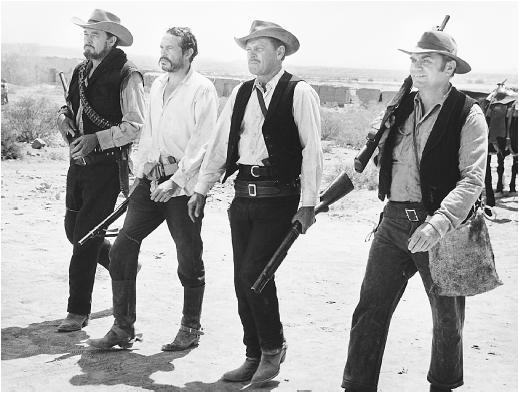 I like a good western as much as the next guy, in fact I count several among my all-time favorites (Butch Cassidy and the Sundance Kid and The Magnificent Seven for example). The fact that The Wild Bunch made the top 100 plus the DVD case said it was one of the best westerns ever made, I was expecting to really enjoy the film. So much for hype. I got about 35 minutes into the film and couldn't take it any more…
I like a good western as much as the next guy, in fact I count several among my all-time favorites (Butch Cassidy and the Sundance Kid and The Magnificent Seven for example). The fact that The Wild Bunch made the top 100 plus the DVD case said it was one of the best westerns ever made, I was expecting to really enjoy the film. So much for hype. I got about 35 minutes into the film and couldn't take it any more…
I think there is something about the late 60s and film making that I just don't get. I think directors like Sam Peckinpah and Dennis Hopper (Easy Rider which I really disliked) were either stoned or simply trying too hard to be different that they forgot about the fact that films still need a story to be interesting. The Wild Bunch was so slow and the acting was so over-the-top Western camp that it hurt to watch. I'm sure this film was considered "different" when it came out because it wasn't a John Wayne/Gary Cooper type western, but it was just flat out dull.
Next: Modern Times
Filed under: AFI Top 100








September 3, 2011
Magical Realism on the Shores of Japan
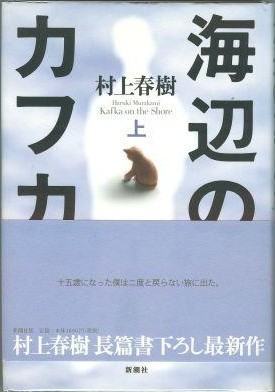 I don't tend to give out five-star ratings very lightly; in fact, the only book I've read this year that was worthy of five stars was Cloud Atlas. Until now. This morning I finished Haruki Murakami's Kafka on the Shore and it was one of the most enjoyable books I've read in a long, long time. 460 pages hasn't gone by so fast in a while! Murakami's novel came out in 2002 in Japan but was released in the U.S. in English a few years later. I had heard of the book, and the author, but I hadn't read it nor anything by Murakami. I guess I had some preconceived notion based on stereotype that Japanese novels were always about World War II or Geisha girls and what not, but of course like any cliché that couldn't be further from the truth. Kafka on the Shore is a brilliant novel that crosses multiple genres and takes the reader on a strange journey that would make Franz Kafka himself proud.
I don't tend to give out five-star ratings very lightly; in fact, the only book I've read this year that was worthy of five stars was Cloud Atlas. Until now. This morning I finished Haruki Murakami's Kafka on the Shore and it was one of the most enjoyable books I've read in a long, long time. 460 pages hasn't gone by so fast in a while! Murakami's novel came out in 2002 in Japan but was released in the U.S. in English a few years later. I had heard of the book, and the author, but I hadn't read it nor anything by Murakami. I guess I had some preconceived notion based on stereotype that Japanese novels were always about World War II or Geisha girls and what not, but of course like any cliché that couldn't be further from the truth. Kafka on the Shore is a brilliant novel that crosses multiple genres and takes the reader on a strange journey that would make Franz Kafka himself proud.
The novel tells the story of 15-year-old Kafka Tamura, who runs away from home to escape his father, a famous sculptor and possibly a mad cat-killing psycho. The other protagonist is Satoru Nakata, a 60-year-old man who lost most of his intelligence after a strange flash in the sky during World War II and who as a result can talk to cats and make it rain fish. The two are connected but never meet, and in the spirit of the magical realism of the novel may in fact be the same person! Nakata is also on a journey, having killed Kafka's father (maybe, or perhaps it was Kafka acting through Nakata). Kafka ends up in a quiet beach town where he may or may not have discovered his mother and sister, both of whom abandoned him and his father when Kafka was four. Nakata is not so much running from the murder charges as much as he's running toward an event that may set him free from his chains and potentially shed light on Kafka's life story. Along the way we meet strange characters like a pimp dressed up like Colonel Sanders, a pair of Japanese soldiers from World War II who have not aged and who guard the entrance to a magical place that may be the gateway to heaven (or hell), and a transgender librarian who helps Kafka discover his place in the world. Oh yeah, Kafka may also be sleeping with his mother and gets a hand job from a teenage girl who may be his sister. Can you see why Kafka on the Shore has been compared to a Greek tragedy and a Gabriel Garcia Marquez novel?
Murakami's novel is certainly Kafkaesque, but it's also tender and funny and inspiring. Both Kafka Tamura and Satoru Nakata are honorable and empathetic characters who as a reader you can't help but root for. Kafka has clearly had a troubled childhood and his father didn't help matters. When he runs away from home he is searching for himself as well as his mother and sister and like any coming of age story the trials he goes through, both mental and physical, shape his future in a positive way. Nakata is a tragic character because he is dumb and lives on a "sub city" from the "Governor" as he says. But he's also a strong character because he is unselfish and good (he kills the mysterious cat killer only to save the lives of other cats he has befriended and because the man encourages him to kill him). But for me it's the magical realism that makes the story so amazing. The reader never really knows what is real and what is not in the story. Some of the characters and events may or may not be what they appear to be, and may even be figments of Kafka's imagination. These mysteries do not ultimately reveal themselves but rather the reader is left to ponder them at the conclusion of the book. In fact, after the novel was published Murakami put up a website for readers to ask questions and it received more than 8,000!
Kafka on the Shore is the kind of novel that reaffirms why I love reading so much. I literally couldn't put down my Nook and several times fell asleep on the sofa reading because I didn't want to put it down and go to bed. I highly recommend it, especially if you like magical realism, and even if you have no idea what magical realism is this novel is a great introduction to it. As for me, expect to see a whole bunch of Murakami books added to my "to-read" list.
Filed under: General








August 28, 2011
AFI #80: The Apartment
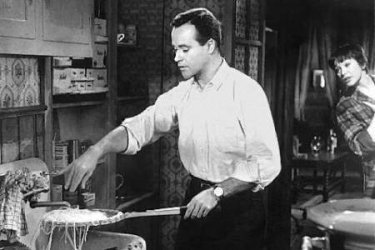 If you're like me and you love Mad Men you really owe it to yourself to see The Apartment, the 1961 Academy Award winner for Best Picture. The film has to be the inspiration for the popular TV series, either that or Mad Men creator Matthew Weiner is the reincarnation of director Billy Wilder. The comparisons are numerous.
If you're like me and you love Mad Men you really owe it to yourself to see The Apartment, the 1961 Academy Award winner for Best Picture. The film has to be the inspiration for the popular TV series, either that or Mad Men creator Matthew Weiner is the reincarnation of director Billy Wilder. The comparisons are numerous.
The Apartment is about a low-level employee at a big insurance company (played by Jack Lemmon) who has found an interesting way to get ahead — he loans out his apartment to company executives to use for their extramarital trysts. Everything seems to be going fine until one of the executives messes with the gal he has a little crush on. It's a romantic dramedy set in 1960s Manhattan.
The film is classic Billy Wilder, who also directed such great films as Some Like it Hot and Sunset Boulevard (both of which rank high on the AFI list). What sets The Apartment apart for me is the wonderful and quick-witted dialogue and the spot-on performance by Lemmon. While Lemmon did not win the Oscar for his role (he lost to Burt Lancaster in Elmer Gantry) he was superb and was recognized with a Golden Globe. Lemmon was brilliant in so many roles, and for me he'll always be The Odd Couple's Felix Unger, but I'll now add his portrayal of bachelor C.C. Baxter to the list of his memorable characters.
Shirley MacLaine was also nominated for an Oscar for her work in The Apartment (she lost out to Elizabeth Taylor), and her adorable elevator operator Fran Kubelik was nicely done. Fred MacMurray plays the awful head of "personnel" who is the Don Draper of the film. I have always equated MacMurray to his role as the perfect dad on My Three Sons so it was weird for me to see him as a womanizing ass.
The office scenes in The Apartment were pure Mad Men. The women were all secretaries and sleeping with the executives. The executives were always smoking and drinking and cheating on their wives. One secretary is even fired after spilling the beans on MacMurray's affair (apparently sexual harassment wasn't a legal issue in 1960). It's a very enjoyable film and a real throwback to a time that seems like generations ago but wasn't really all that long ago. Definitely worth seeing.
Next up: The Wild Bunch
Filed under: AFI Top 100








August 21, 2011
AFI #81: Spartacus
 The term epic is defined as heroic, majestic, impressively great. An epic motion picture is one that spans generations like The Godfather or one that is grand in scope and story. Spartacus is without question an epic motion picture, and not just because it's more than three hours long. Typically an epic also involves a hero who achieves greatness and for me the character Spartacus embodies the term. And while Spartacus the film is perhaps an hour or so too long, Spartacus the character is one of the greatest in film history.
The term epic is defined as heroic, majestic, impressively great. An epic motion picture is one that spans generations like The Godfather or one that is grand in scope and story. Spartacus is without question an epic motion picture, and not just because it's more than three hours long. Typically an epic also involves a hero who achieves greatness and for me the character Spartacus embodies the term. And while Spartacus the film is perhaps an hour or so too long, Spartacus the character is one of the greatest in film history.
The film was made in 1960 and directed by Stanley Kubrick who would go on to make such classic films as 2001: A Space Odyssey, A Clockwork Orange, Full Metal Jacket and The Shining. Until Spartacus I think the epics were a bit corny and it's easy for me to compare Spartacus to Ben Hur (which readers of this blog will remember I did not like). While Ben Hur (#100 on the AFI list) was poorly acted and the plot was ridiculous, Spartacus kicks it up a notch with tremendous acting by Kirk Douglas, Laurence Olivier and Peter Ustinov (who won an Oscar for his role). The plot tells the story of the Roman slave Spartacus, who leads a slave uprising and eventually takes on the Roman army in a deadly battle for freedom. And while the story doesn't end well for the slaves, I like the realism there and of course the legend of Spartacus becomes more powerful than the life itself. I wasn't around in 1960, but I bet Spartacus was considered trailblazing in its time. Just think…only a few years later Kubrick made Dr. Strangelove, 2001, and A Clockwork Orange. These were not simple Hollywood stories, but rather the start of a new era of film making and it's easy to see why Kubrick was so influential.
I am surprised Spartacus didn't even get nominated for a Best Picture Oscar, even though it won the Golden Globe for best picture. Awards (and lists like AFI for that matter) are so darn subjective. Interestingly, the film that did win the best picture Oscar that year (The Apartment) is next on the AFI list so I'll get an immediate comparison.
Kind of lost in the story is the fact that it's based on actual history. Spartacus lived from around 109-71 B.C. and did indeed lead a slave rebellion against the Romans. In fact, Spartacus himself is referenced throughout literature, film and pop culture and is often considered one of the greatest heroes in human history. It's interesting that so many of our heroes are forced into action because of oppression. I suppose the reason I'm not a hero, for example, is because I have such an easy life in comparison to men and women like Ghandi, Joan of Arc and MLK. I wonder if being a hero is something we're all born with but it only comes out in dire circumstances? Hope I never have to find out if I am Spartacus!
Next up: The Apartment
Filed under: AFI Top 100











